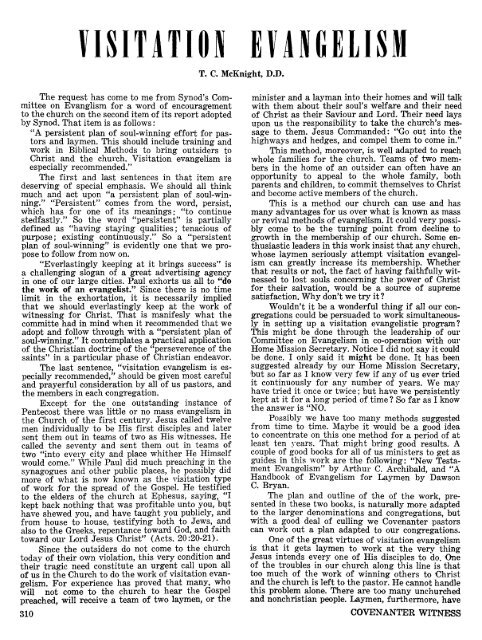Covenanter Witness Vol. 53 - Rparchives.org
Covenanter Witness Vol. 53 - Rparchives.org
Covenanter Witness Vol. 53 - Rparchives.org
Create successful ePaper yourself
Turn your PDF publications into a flip-book with our unique Google optimized e-Paper software.
stedfastly."recommended."soul-winning"continuously."evangelist."soul-winning."saints"come."success"VISITATIONT. C. McKnight, D.D.EVANGELISMThe request has come to me from Synod's Committee on Evanglism for a word of encouragementto the church on the second item of its report adoptedby Synod. That item is as follows :"A persistent plan of soul-winning effort for pastors and laymen. This should include training andwork in Biblical Methods to bring outsiders toChrist and the church. Visitation evangelism isespeciallyThe first and last sentences in that item areof special emphasis. We should all thinkdeservingmuch and act upon "a persistent plan of soul-winning.""Persistent"comes from the word, persist,which has for one of its meanings: "to continueSo the word "persistent" is partiallydefined as "having staying qualities; tenacious ofpurpose; existingSo a "persistentplan ofis evidently one that we propose to follow from now on."Everlastingly keeping at it bringsa challenging slogan of a great advertising agencyin one of our large cities. Paul exhorts us all to "dothe work of anSince there is no timelimit in the exhortation, it is necessarily impliedthat we should everlastingly keep at the work ofwitnessing for Christ. That is manifesly what thecommitte had in mind when it recommended that weadopt and follow through with a "persistent plan ofIt contemplates a practical applicationof the Christian doctrine of the "perseverence of thein a particular phase of Christian endeavor.peciallyThe last sentence, "visitation evangelism is esrecommended,"should be given most carefuland prayerful consideration by all of us pastors, andthe members in each congregation.Except for the one outstanding instance ofPentecost there was little or no mass evangelism inthe Church of the first century. Jesus called twelvemen individually to be His first disciples and latersent them out in teams of two as His witnesses. Hecalled the seventy and sent them out in teams oftwo "into every city and place whither He Himselfwould While Paul did much preaching in thesynagogues and other public places, he possibly didmore of what is now known as the visitation typeof work for the spread of the Gospel. He testifiedto the elders of the church at Ephesus, saying, "Ikept back nothing that was profitable unto you, buthave shewed you, and have taught you publicly, andfrom house to house, testifying both to Jews, andalso to the Greeks, repentance toward God, and faithtoward our Lord Jesus Christ" (Acts. 20:20-21).Since the outsiders do not come to the churchtoday of their own violation, this condition andverytheir tragic need constitute an urgent call upon allof us in the Church to do the work of visitation evangelism. For experience has proved that many, whowill not come to the church to hear the Gospelpreached,310will receive a team of two laymen, or theisminister and a layman into their homes and will talkwith them about their soul's welfare and their needof Christ as their Saviour and Lord. Their need laysupon us the responsibility to take the church's message to them. Jesus Commanded: "Go out into thehighways and hedges, and compel them to come in."This method, moreover, is well adapted to reachwhole families for the church. Teams of two members in the home of an outsider can often have anopportunity to appeal to the whole family, bothparents and children, to commit themselves to Christand become active members of the church.This is a method our church can use and hasmany advantages for us over what is known as massor revival methods of evangelism. It could very possibly come to be the turning point from decline togrowth in the membership of our church. Some enthusiastic leaders in this work insist that any church,whose laymen seriously attempt visitation evangelism can greatly increase its membership. Whetherthat results or not, the fact of having faithfully witnessed to lost souls concerning the power of Christfor their salvation, would be a source of supremesatisfaction. Why don't we try it ?Wouldn't it be a wonderful thing if all our congregations could be persuaded to work simultaneously in setting up a visitation evangelistic program?This might be done through the leadership of ourCommittee on Evangelism in co-operation with ourHome Mission Secretary. Notice I did not say it couldbe done. I only said it might be done. It has beensuggested already by our Home Mission Secretary,but so far as I know very few if any of us ever triedit continuously for any number of years. We mayhave tried it once or twice ; but have we persistentlykept at it for a long period of time ? So far as I knowthe answer is "NO.Possibly we have too many methods suggestedfrom time to time. Maybe it would be a good ideato concentrate on this one method for a period of atleast ten years. That might bring good results. Acouple of good books for all of us ministers to get asguides in this work are the following: "New Testament Evangelism" by Arthur C. Archibald, and "AHandbook of Evangelism for Laymen by DawsonC. Bryan.The plan and outline of the of the work, presented in these two books, is naturally more adaptedto the larger denominations and congregations, butwith a good deal of culling we <strong>Covenanter</strong> pastorscan work out a plan adapted to our congregations.One of the great virtues of visitation evangelismis that it gets laymen to work at the very thingJesus intends every one of His disciples to do. Oneof the troubles in our church along this line is thattoo much of the work of winning others to Christand the church is left to the pastor. He cannot handlethis problem alone. There are too many unchurchedand nonchristian people. Laymen, furthermore, haveCOVENANTER WITNESS
















